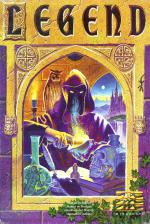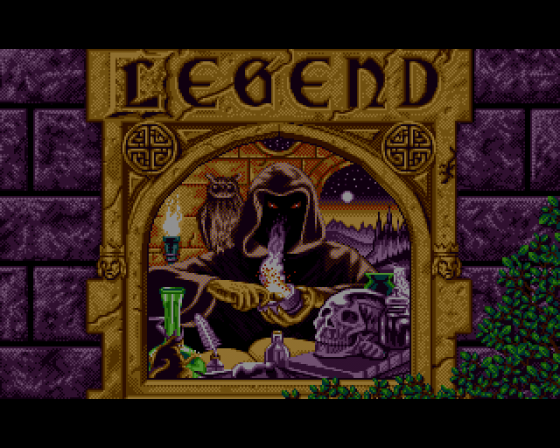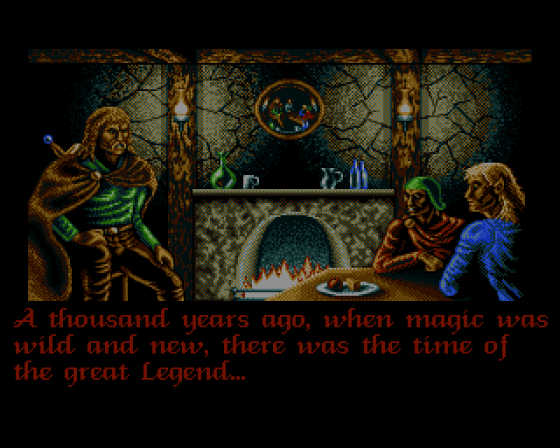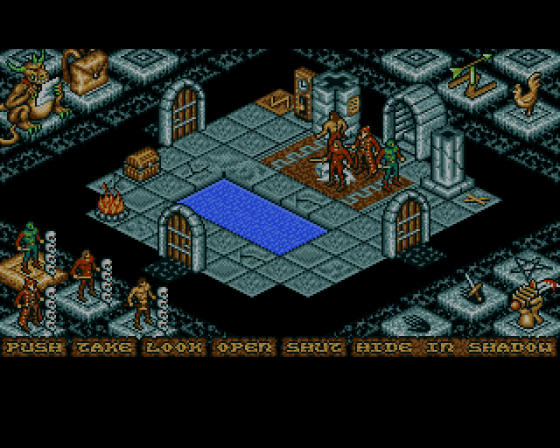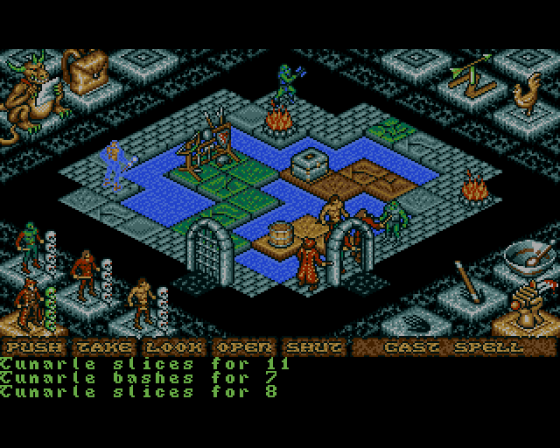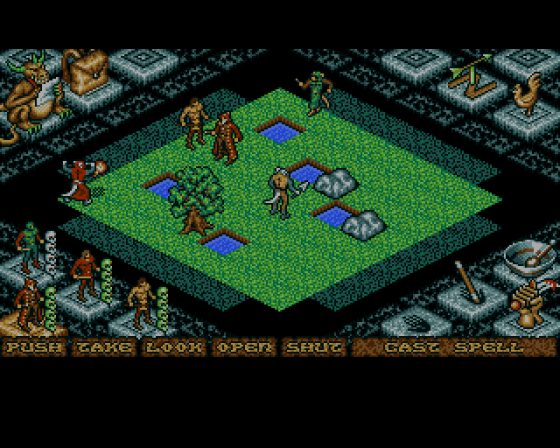
Amiga Power
 1st June 1992
1st June 1992
Legend
Coming to this iso-dungeon fantasy romp fresh from a couple of similar swords and sorcery soirees in the shape of Celtic Legends and Eye Of The Beholder 2, I was quite prepared for this to be a fairly standard puzzle-and-bosh bash through the usual AD&D-inspired scenario.
Not so! Legends is something different. Indeed, Legends is something for which I can happily throw away the review rulebook and state, right here, right now, that it's a must, must buy. Why? Because it's such an utterly fabulous thing, that's why. There are few games that instantly grab my attention and keep me riveted to the screen, spending hours of otherwise profitable time just to see what happens next. And there are even fewer that feature a sheer open-endedness that inspires you to simply forget the plot and go off in your own direction (only returning when necessary to what the designer intended), just to enjoy the immense vista of adventure waiting there in the game world.
If I've not already done away with the need for the rest of this review - and the more discerning, who'll want to know exactly what the hell it is I'm raving about, should still be reading - here is, as precisely and concisely as I can, why you've got to buy this game.
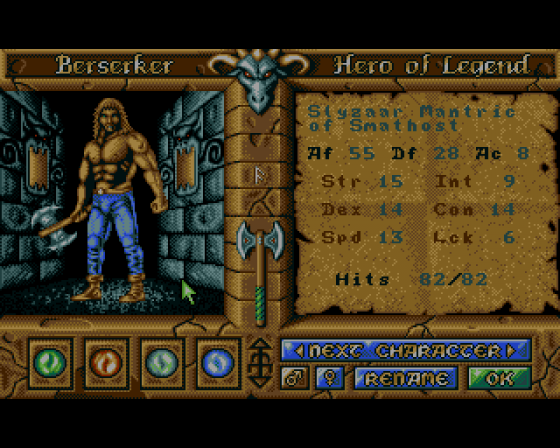
Let's start, and it's a very good place to start, with the plot. Evil and chaotic forces are out and about in the land of Trazere, doing their usual evil thing, and the entire population is typically witless in terms of dealing with it. The task of vanquishing this outbreak of malevolence is down to four heroic adventurers drawn from far and wide - essentially, you and your mouse. So what's new?
Well, for starters, there's the swings and roundabouts of character generation. Four elements - earth, air, fire and water - can be manipulated to equip members of the four-strong team of adventurers with appropriate attributes. There's a selection of berserker, runemaster, assassin and troubadour, each of whom needs different combinations of strength, dexterity, intelligene and the rest with which to clobber the Adversary. You can even choose the sex of each member - let's see more of this in computer games. (Indeed, it's something I immediately took advantage of.)
Right, so it's time for my four-girlie party to descend into the catacombs of Treihadwyl (the first part of the game), in which to battle foul monsters, solve tortuous puzzles and gain the means to progress to the next part of the adventure.

Each room of the caverns below Treihadwyl is isometrically rendered in impressive detail, the party members included. There are a few puzzles to work out before you can move on, but let's look first at a particularly impressive feature, auto-mapping. As you move through each corridor and room, a map is automatically sketched and can be called up at any time. Damn useful and much more fun than plotting on graph paper.
Church Of The Free-Willed Mind
And there's the character movement. Far be it from me to call it 'intelligent' - computers are still pretty thick! - but the party members move around in a co-ordinated way, shifting out of the way of each other, in superbly animated routines. Then, when monsters come piling in, the whole thing goes into uproar as each figure on-screen runs about beating hell out of anything that looks unfriendly. It really is a hoot to watch.
In battle, there are various character specialities that can be switched on from icon or keyboard. The berserker will go into a rage if provoked and run around mightily smiting; the assassin will hide in shadows, becoming a faint outline image and that much harder for monsters to hit, the troubadour will not only fight, but play a song (pretty versatile stuff). This isn't just for everybody's entertainment either. Songs, bought from a minstrel who roams the wider world, have different properties - party strength can be increased by a suitable ditty, or hit points are regenerated more rapidly to the strains of another.

However, it's the runemaster who is the most fun. He or she can mix and cast spells possessed of an incredible variety of functions. Damage missiles, spells of enslavement, healing spells, protection from magic spells, they're all available. The main thing here is that you are not limited to a set roster of enchantments. The superb magic system means that hundreds of spells, most of which you must invent yourself, are possible just by combining the ingredients available. This is a first for a fantasy game; a wizard unrestricted by hard and fast rules on what magical powers can be exercised. You're not even limited by the runemaster's level of ability - so long as you have the ingredients and the appropriate runes, which can be bought from a wizened character called The Ancient, the most complex and destructive spells can be wrought.
There are also a fair few magic items to be collected in the dungeon. Wands, potions, rings, scrolls and bits of magic armour are littered about in abundance, many of which have pretty spectacular effects, but which must be sussed out either through trial and error or explained by the aforementioned Ancient. Any oddments picked up are stored and accessed via an inventory screen, which also gives statistics on how each character is faring. It's best to keep a close eye on whatever booty you've got, as some items are needed to complete other dungeons, while armour and weaponry can be sold for a fair old whack to town-based traders.
Character control is a doddle. Click on the character icon, click on where you want it to go and off it trots. Shunting individual members around is important for some of the puzzles and traps, as they often require a character to stand on a particular slab of stone while another operates a lever to open a door or to stop spikes from nobbling the party's progress. More often than not, the puzzles are real swines to solve - level two of Treidhawyl had me cursing for hours as I tried to gain access to a room containing a vital ornate key for use in another part of the dungeon. As usual, the runemaster played the vital role, but the spell needed to resolve the situation is not at all obvious.
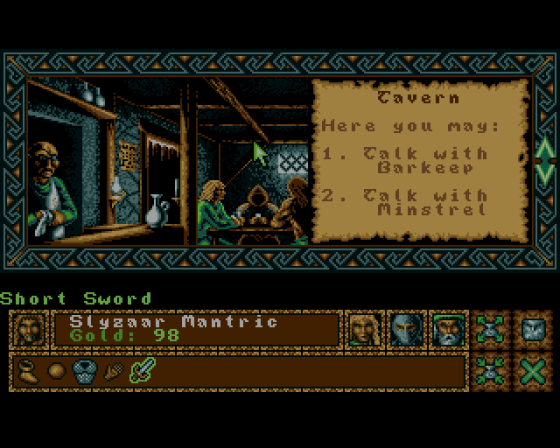
And that's not all. Throughout all the dungeon-trawling, monster-bashing, puzzle-solving, treasure-grabbing hoo-hah, there's still the opportunity to zip out into the overworld and do a bit of trade. Having thrashed a few monsters and nicked their gold, it can be exchanged for better armour at the blacksmith, magic items at the artifcer, spell ingredients at the apothecary or a prayer for better luck. Better resistance to otherwise lethal blows is available at the temple and, for the terminally luckless, resurrection of dead party members is free. Tramping from village to town to village can also lead the party into conflict with enemy armies - best avoided in the early stages of the game as they're pretty tough to overcome.
In all, Legend offers an immense and complex game which looks good, is easy to paly at whatever level you fancy tackling it, and is hugely absorbing. There's great action, boggling brain-teasers and a versatile plot, all of which make it perhaps the most enjoyable RPG yet. As I said before, definitely make it one to add to your collection.
The Bottom Line
Uppers: Fabulous graphics, an easy interface and the right combination of action and strategy. Better than Ultima VI for first-time RPGers too - you'll lose sleep over this, for sure.
Downers: The characters can look a little silly when running about ("...they call it Madness") and are inclined to get in each other's way. Otherwise, this is pretty much a fault-free zone.
Super, smashing, lovely. A real ground-breaker, great fun, completely non-linear (and, because of that, in possession of one of the most believable game worlds to date), it fully deserves to sit right at the top of its generic heap. At the risk of rubbing the message in yet again, a must buy.

